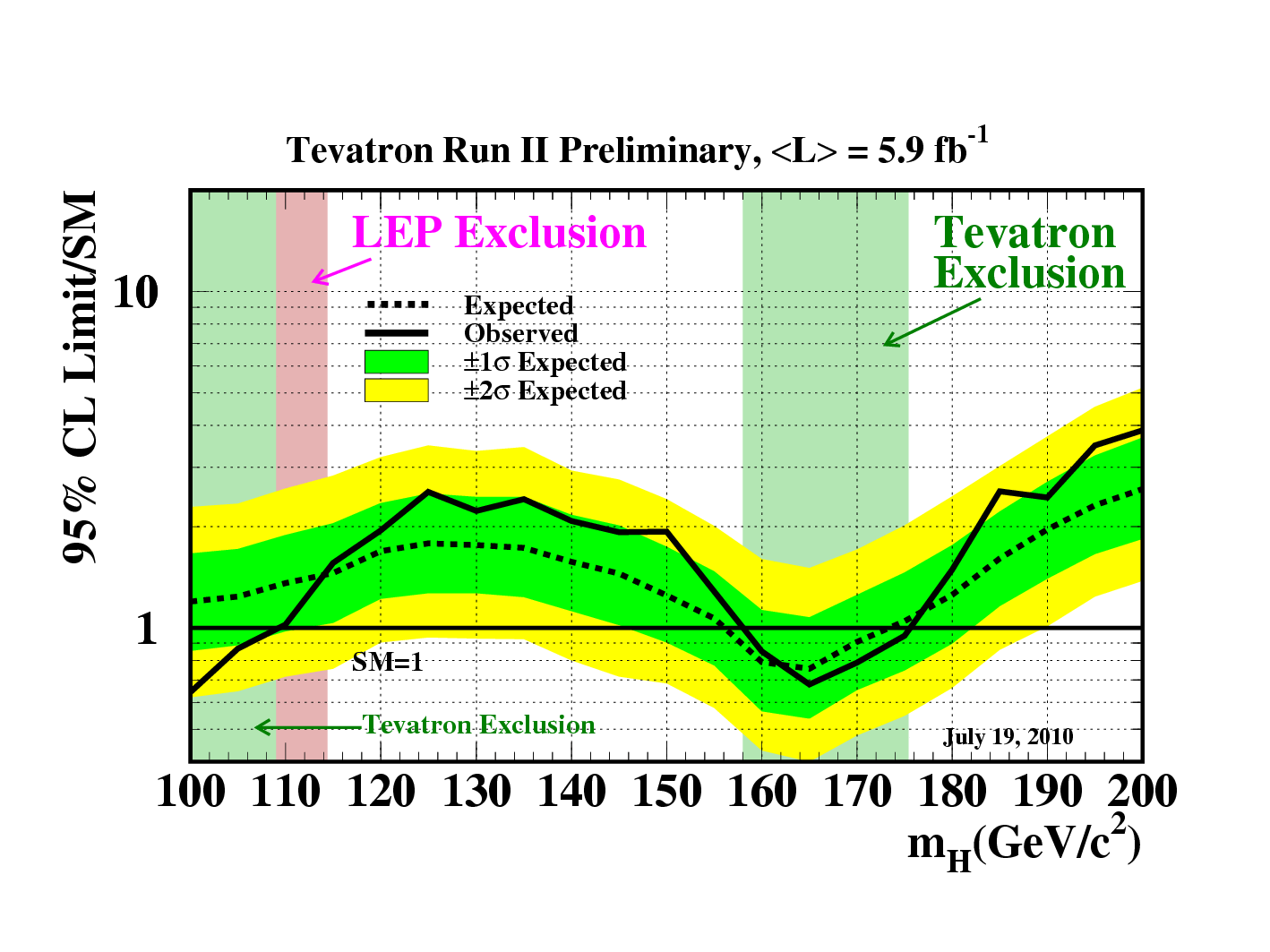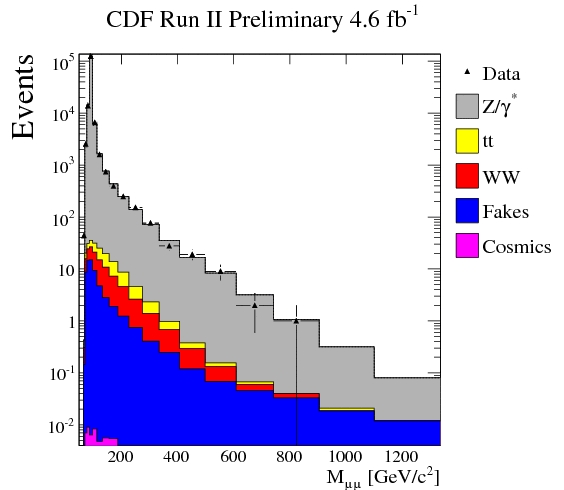2011 to me means the summer conferences here. The 2011 winter conferences will happen in just a few months and make any prediction rather dull (I know pretty well what the collaborations are going to show there already), while the 2012 winter conference -well, they're in 2012, duh. Summer 2011 conferences will occur in the summer of 2011 (this is already a quite definite prediction) and more precisely in July and August. Physicists from the Tevatron and LHC experiments will push hard to produce the best results they can in time for their (or their bosses') talks. What will they show there ?
The data
First of all, what data will they be analysing: this is the mother of all questions. The Tevatron has been running very steadily and it is by no means hard to predict that CDF and DZERO will be presenting results based on up to 9 inverse femtobarns of collisions; actually let me be precise; I believe they will barely arrive at 8.5 /fb or so in the most straightforward searches (like those for a Z' boson) and in just a bit less (8/fb) in the most important ones (like those for H->WW), while they will be anywhere between 6 and 8/fb in less "data-hungry" analyses.
As for the LHC, the prediction is much harder to put together: we do not know yet even what exactly will the proton energy be, nor when will LHC restart colliding. The predictions are 8 TeV for the centre-of-mass energy, and end of March for the restart; I foresee that by July ATLAS and CMS will present analyses based on integrated lumiinosities of 200 to 500 inverse picobarns of data.
So with the quoted data what will they be showing ? Let us go in order.
Higgs, Higgs
No signal of course, but slightly improved limits on its existence.
 The Tevatron will produce a new combined limit for the Standard Model Higgs boson which will look similar to the one seen last year (see right), but with 25% more data and some additional small improvement in the analysis strategy they can reach down a bit further. I believe they will NOT be excluding the LEP II "signal" yet, although they will get very close to doing so; their 95% CL limit will extend to 153-182 GeV in the high-mass region.
The Tevatron will produce a new combined limit for the Standard Model Higgs boson which will look similar to the one seen last year (see right), but with 25% more data and some additional small improvement in the analysis strategy they can reach down a bit further. I believe they will NOT be excluding the LEP II "signal" yet, although they will get very close to doing so; their 95% CL limit will extend to 153-182 GeV in the high-mass region.ATLAS and CMS will not combine their results on the Higgs instead. Their 95% confidence-level limits will surpass those of the Tevatron, and will extend from 145 to 180 GeV. I do not foresee big differences between the results that the two experiments will produce: their sensitivity is similar.
Z', compositeness, and other high-mass stuff
 No signal here either, but the LHC will discourage any further attempt by the Tevatron on searches for Z' bosons or other high-mass resonances. The limits that the LHC experiments will place on a Z' will likely reach out to 2 TeV, while the limits on compositeness of quarks will exceed 5 TeV. (On the left is the most constraining limit set so far, that of the CDF collaboration, which excludes Z' bosons with mass below a TeV or so).
No signal here either, but the LHC will discourage any further attempt by the Tevatron on searches for Z' bosons or other high-mass resonances. The limits that the LHC experiments will place on a Z' will likely reach out to 2 TeV, while the limits on compositeness of quarks will exceed 5 TeV. (On the left is the most constraining limit set so far, that of the CDF collaboration, which excludes Z' bosons with mass below a TeV or so).Top quark mass measurements
Here we will see the first shy attempts of ATLAS and CMS to challenge CDF and DZERO on their favourite battling ground. The precision measurements of the top quark mass benefit from the excellent understanding that the Tevatron experiments have obtained of their detectors, as well as on the large datasets so far collected. The total error on the top quark mass will fall for the first time below 1 GeV, something like 173.0+-0.9 GeV or so. In Europe, measurements with a precision of 2-3 GeV will be possible, but not much below that, due to the still large uncertainty on the jet energy scale.
New effects, anomalies, and puzzles
The Tevatron has recently published anomalous asymmetries in the top pair production. These will continue to hold, a sign that the effect is systematic and not statistical. However, I do not believe that the source of the discrepancy will be understood in just six more months of work.
Other standing anomalies include the potential excess of MSSM-like Higgs bosons, for which there is a 2-sigmaish excess both in CDF and DZERO for H->bb resonances at 150 GeV or so. This also is a systematic effect, and I believe that only a better understanding of QCD production of multiple b-quark jets may solve the issue -and this too will have to wait much longer than half a year. Similar excesses will continue to inspire, vacuously, the more credulous minds.
Finally, CDF has shown a 2-sigma excess in the search for a 4-th generation t' quark. Again, this is in my humble opinion just a misnomer for a ill-understood QCD background shape; so the excess is not going to disappear, unless the authors change their background parametrizations.
And what will the LHC have to show to inspire us ? This is quite an interesting question. In principle, ATLAS and CMS have the potential to discover a light SUSY signal quite early on -that is, now, or in the next few months. Not being a believer, I can only say that some excess or discrepancy will dutifully appear in one of the hundreds of histograms that will be searched by the CERN experiments. The look-elsewhere effect will have to be enforced without pity in order to attribute those effects to their most likely cause -fluctuations.
All in all...
All in all, I do not believe that I need to cancel my long-planned summer vacations to southern Greece in order to show up for the announcement of a new physics discovery. My safest prediction, in fact, remains that we will not see anything extraordinarily sexy in the next few months. Fluctuations, yes; 2- and 3-sigma excesses, yes. But nothing capable of changing my vacations agenda!
PS: I realize that in the above text I have mentioned several topics which are potentially interesting to you. If you need references, please ask them in the comments thread below.
Disclaimer of Liability: I do disclaim thee, oh Liability!
The above text represents the personal opinion of the author. They do not in any way reflect those of the scientific collaborations of which he is a member.





Comments